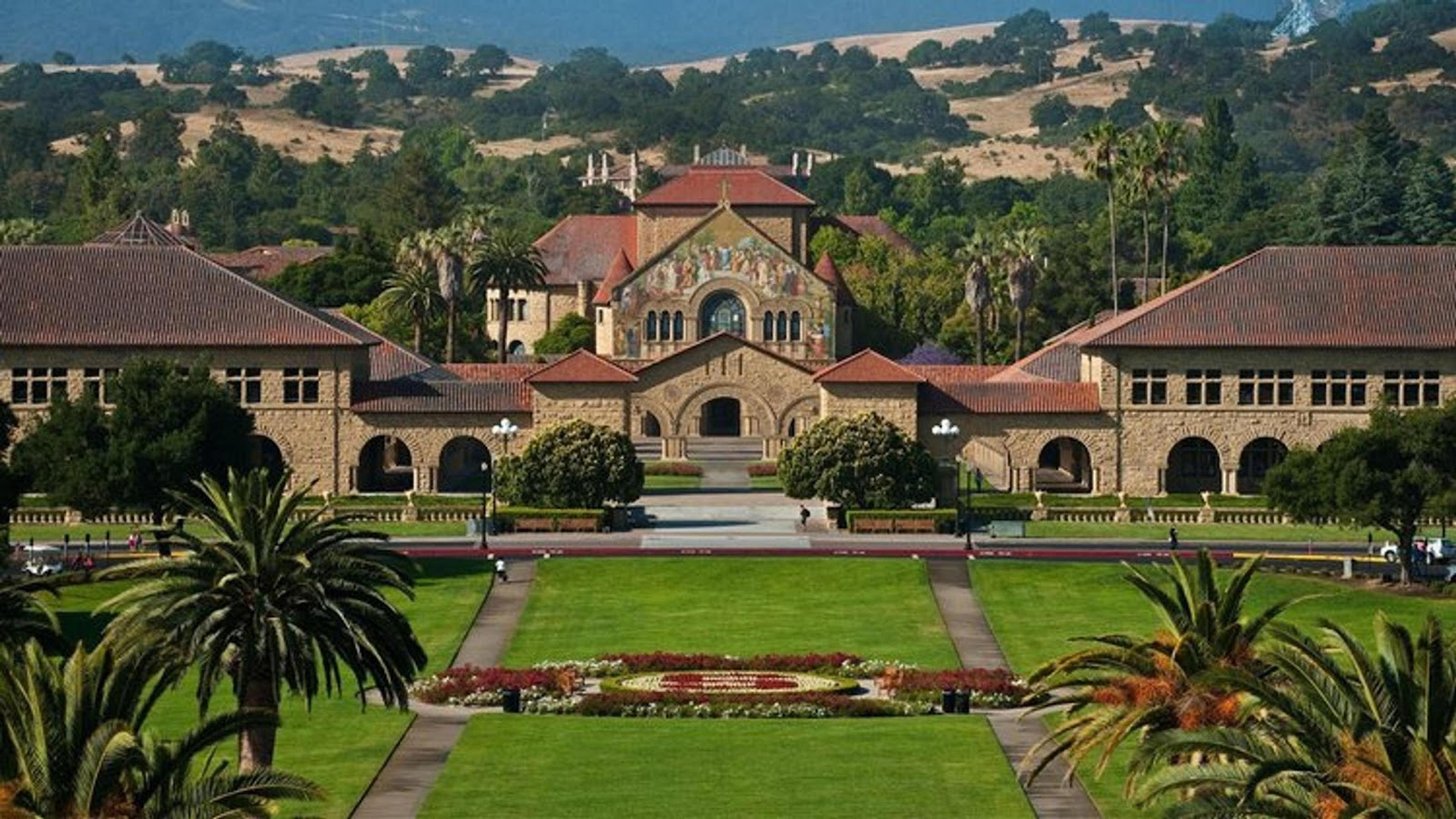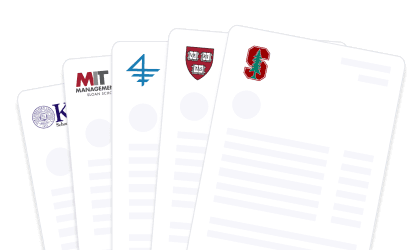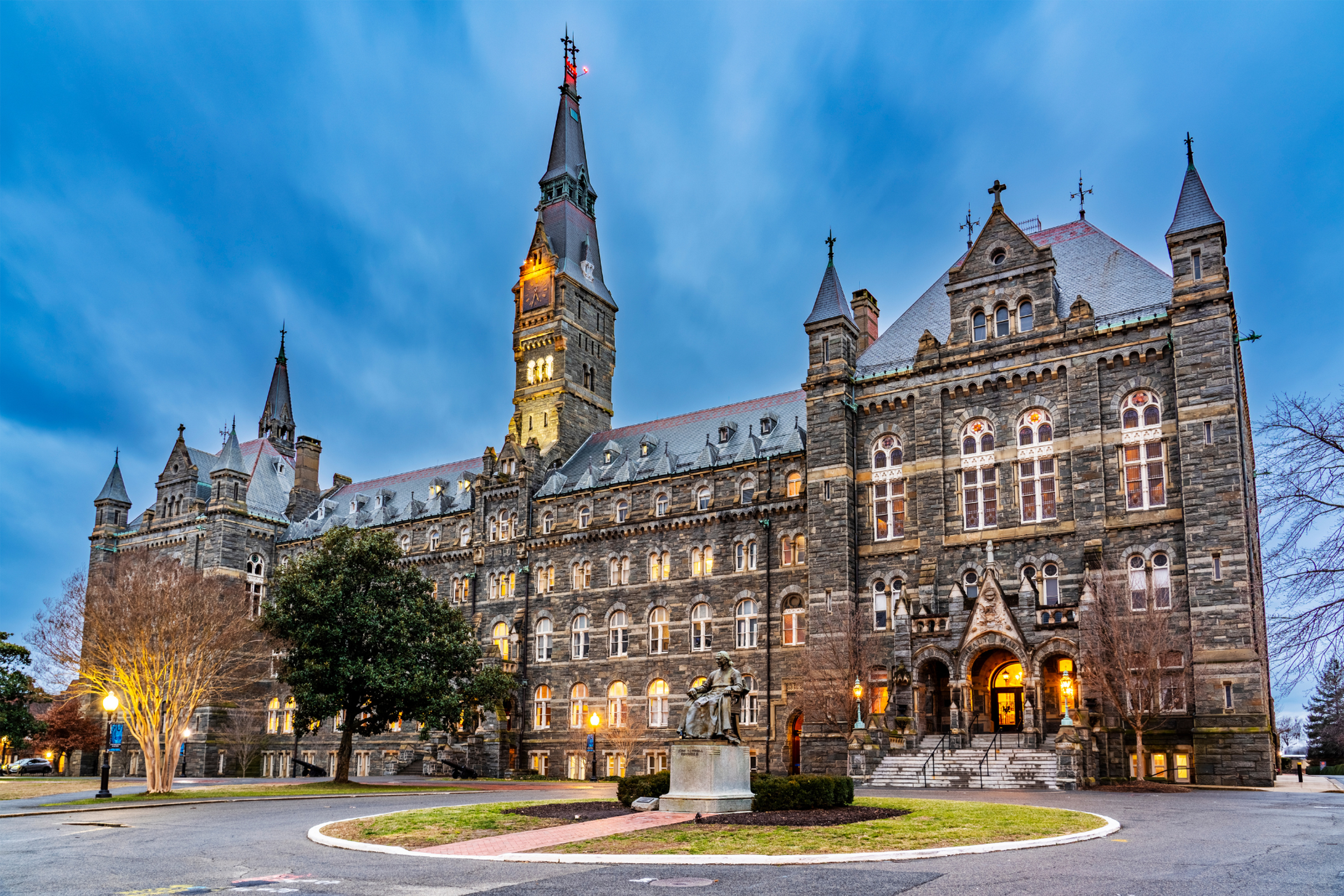Stanford MBA Recommendation Letter – Questions, Tips, & Admit Examples
Get clear guidance on the Stanford MBA recommendation letter, including required questions, recommender tips, and examples that highlight what Stanford values.
Posted June 26, 2025

Join a free event
Learn from top coaches and industry experts in live, interactive sessions you can join for free.
Table of Contents
Are you thinking about applying to the Stanford Graduate School of Business (GSB) to pursue an MBA? If so, you've come to the right place. The Stanford MBA recommendation letter plays a key role in the GSB admissions process. It helps the admissions committee evaluate your ability to lead, grow, and contribute in complex and unfamiliar environments. This article breaks down what Stanford is asking, how to guide your recommenders in a manner that will foster mutual respect, and what a strong letter really looks like.
In this comprehensive guide, we walk you through everything you need to know about Stanford GSB MBA letters of recommendation, including the questions asked, expert tips for crafting powerful letters, and examples from successful admits. So let's dive in and help you enhance your application with stellar recommendation letters!

How Stanford GSB Uses Recommendation Letters
The Stanford Graduate School of Business requires two letters of recommendation for each MBA applicant. These letters provide insight into your strengths, growth potential, and how you compare to other well-qualified individuals in similar roles. As the only external perspective on your profile, these recommendation letters offer a unique and important perspective to the GSB admission committee.
Stanford values successful leadership, clear communication, resilience in challenging situations, and a strong fit with the school’s mission. These letters help measure those qualities beyond what can be captured in a resume or essay and improve collective outcomes respect. Do not underestimate the importance of stellar recommendation letters!
Note: Recommenders must be registered in the system and assigned the appropriate role. If they are writing the “current direct supervisor” letter, they should not change that designation.
Requirements for the Stanford MBA Recommendation Letter
Who Should Write the Letters?
Stanford GSB requires two letters of recommendation, and selecting the right individuals to write them is critical to presenting a strong and accurate picture of your leadership ability, personal growth, and professional performance.
The first letter must come from your current direct supervisor. This is typically the person you report to on a day-to-day basis at work. Stanford places significant weight on this letter because it reflects your most recent professional performance in real-world settings. This individual can provide firsthand insight into how you approach critical or potentially risky experiences, lead projects, resolve conflicts, and handle negative feedback while collaborating with others to improve collective outcomes. If obtaining a letter from your current supervisor is not feasible, such as if you’re self-employed, working in a family business, haven't disclosed your application plans, or are unemployed, Stanford allows you to submit a letter from the next best alternative.
Acceptable alternatives include:
- An indirect manager or project lead you reported to regularly
- A former direct supervisor from a previous role
- A client, investor, or board member if you are self-employed or a founder
- An academic advisor or team leader from a long-term volunteer or extracurricular role (only if work-based recommenders are not possible)
Expert Tip: In these cases, you’ll be asked to explain your choice and the context during the application. Choose someone you trust who has observed your performance closely and can objectively compare you to well-qualified individuals in similar roles. Stanford will expect clear, specific examples of your principal strengths, leadership qualities, and impact.
The second recommendation should come from another leader who has supervised you in a professional, academic, or community setting. This person should also be in a position to evaluate your contributions directly and describe your behaviors in meaningful ways. This person should reinforce different aspects of your candidacy than the first recommender, providing additional perspective on your personal qualities, adaptability in challenging situations, or how you’ve handled setbacks and feedback. Ideal second recommenders might include:
- A previous manager from another organization
- A team leader from a volunteer or nonprofit initiative
- A supervisor from a startup or side project
- A professor or research advisor (if you're a recent graduate or student)
Note: Avoid using peers, subordinates, personal mentors, or family members. Stanford is clear: recommenders must be able to provide objective, first-hand insight into your performance, and compare you to others in similar roles. Letters that lack this objectivity will weaken your application.
Expert Tip: If you’re applying across multiple rounds or schools, remember to confirm each recommender’s availability and ability to meet deadlines. Stanford also asks recommenders how many candidates they are recommending that year, a detail that helps them understand the recommender's relative familiarity with MBA candidates.

Breakdown of the Stanford MBA Recommendation Questions (2025)
Recommender Info Section
Before writing their responses, your recommender will need to complete a brief section that provides context on your relationship. Stanford GSB uses this information to understand how well the recommender knows you and whether they are positioned to give meaningful, specific examples of your work, growth, and leadership potential. They will be asked to answer the following:
- How long have you known the applicant?Stanford wants to understand the depth and duration of your working relationship. They’re trying to assess whether the person you have selected to be your recommender can credibly speak to your strengths and development areas. A longer relationship often leads to more detailed observations.
- During which period of time have you had the most frequent contact with the applicant?This helps establish whether the recommender has seen your day-to-day behavior or only interacted with you occasionally.
- Are/were you the applicant’s direct supervisor?If the answer is no, the recommender must specify whether they’re an indirect manager, a former supervisor, or another qualified professional. If you are not using a current direct supervisor, you’ll be asked to explain this choice in your application.
- How many candidates are you recommending to Stanford GSB this year?This question helps the admissions team understand whether the recommender is writing for just you or multiple applicants and helps them gauge how familiar the writer is with the recommendation letter process..
- Please describe the applicant’s role in your organization (Limit: 320 characters).This short answer gives the admissions team context for the examples and ratings that follow. It should explain your position, responsibilities, and contributions clearly and concisely.
Note: This section is important because it frames the applicant's performance comparison and signals how closely the recommender has worked with you. Your recommender’s responses should still clearly show why you stand out among well-qualified individuals.

MBA Recommender Prep Doc (Template & Example)
Help your recommender write the strongest possible letters with this prep doc, used by thousands of applicants. Download for free.
Leadership Assessment Categories
Stanford’s leadership assessment is a structured evaluation based on twelve behavioral categories that relate to effective leadership and impact. Your recommender will select one behavior per category that most accurately reflects your typical actions. This format helps Stanford assess your fit with the GSB learning environment and leadership values.
Each trait is rated on a scale that ranges from “No basis for judgment” to high-impact leadership behaviors. If a recommender selects the top behavior in any category, they are expected to support it with specific examples in the written letter. Ideally, the recommenders' ratings align with their qualitative feedback in the letter. Here’s a breakdown of the twelve competencies and what they measure:
| Category | What Stanford Is Looking For |
|---|---|
| Initiative | Takes charge without being asked, especially when facing critical or difficult tasks. |
| Results Orientation | Goes beyond job expectations to achieve goals independently and solve problems proactively. |
| Communication & Poise | Communicates clearly and confidently, even under pressure; leaves a positive and professional impression. |
| Influence & Collaboration | Builds alignment with others, uses tailored influence approaches, and contributes to collective outcomes respect. |
| Respect for Others | Shows expressed respect, invites input, and values acknowledging others' points of view. |
| Team Leadership | Leads effectively by developing others, rewarding contributions, and offering strong organizational support. |
| Developing Others | Provides feedback, coaching, and overarching practical guiding principles to help others grow. |
| Trustworthiness/Integrity | Acts on values and shows high personal integrity, even at personal cost. |
| Adaptability/Resilience | Adapts in unknown or unfamiliar situations, bounces back from failure and welcomes learning opportunities created by setbacks. |
| Self-Awareness | Recognizes own limitations, acknowledges fault, and takes action on desired improvement areas. |
| Problem-Solving | Uses structured thinking to break complex problems, applies logic, and finds reasonable solutions. |
| Strategic Orientation | Understands how actions impact near-term business performance and contribute to long-term business strategy. |
Note: Recommenders are also given a space (up to 500 characters) to explain their ratings if needed. This is especially useful if they choose not to give the highest rating in one or more categories. They can use this space to clarify behaviors, performance trends, or specific contexts where the applicant showed growth. Stanford’s structured assessment discourages inflated praise. Recommenders are encouraged to rate honestly across the scale, as they should also acknowledge how the applicant has overcome obstacles and to avoid choosing the highest score in every category unless supported by measurable achievements.
Stanford MBA Recommendation Questions
Q1: Compare the Applicant’s Performance to Peers
Prompt: How does the applicant’s performance compare to that of other well-qualified individuals in similar roles? Please provide specific examples (e.g., what are the applicant’s principal strengths?).
This question asks the recommender to directly compare the applicant’s performance against a group of well-qualified individuals in similar positions. Stanford is looking for a clear benchmark, not just positive comments.
Strong responses will:
- Highlight the applicant's principal strengths
- Show a clear trajectory of differentiated leadership and achievement
- Include specific examples of achievements or behaviors
- Use metrics, outcomes, and/or observed growth
- Demonstrate successful leadership and long-term value
Recommenders should focus on:
- Instances where the applicant achieved goals independently or completed critical or difficult tasks
- Behavior that reflects positive action influences others or the organization
- Problem-solving in tough and interconnected problems
- Consistent performance in challenging situations adapts, especially under pressure or with incomplete information
- Ways the applicant helped improve collective outcomes or demonstrated strong organizational support in developing others
Expert Tip: Encourage your recommender to use the SCAR framework to structure their answer: Situation (the setting and your role), Challenge (the problem/obstacle/task you faced), Action (what you did and how), Result (what changed, improved, or was accomplished).
Example themes for Q1:
- Launched a new initiative or product that drove results
- Led a cross-functional team through a high-stakes deadline
- Made measurable improvements to a broken process
- Took initiative in an unstructured project without prompting
Q2: Constructive Feedback and Applicant’s Response
Prompt: Describe the most important piece of constructive feedback you have given the applicant. Please detail the circumstances and the applicant’s response.
Stanford uses this question to evaluate the applicant’s self-awareness, willingness to change, and ability to grow from feedback. The school is not looking for surface-level answers or disguised strengths.
Strong responses will:
- Identify a real area for development, not generic or exaggerated flaws
- Explain the impact of the issue (on work, team, or outcomes)
- Describe how the recommender provided constructive feedback
- Show the applicant’s response, including what they changed, how they changed, and what results followed
Examples of authentic topics:
- Weak delegation: Applicant tended to micromanage early on, and later developed trust and team accountability.
- Presentation anxiety: Applicant struggled with clarity in high-stakes meetings, then practiced and improved under pressure.
- Overcommitting: Applicant regularly took on too many tasks, learned to prioritize, and acted consistently under stress.
Other examples could involve:
- Avoidance of conflict → Developed confidence in addressing team tension
- Limited strategic focus → Learned to align projects with broader business goals
- Poor feedback reception → Began to seek input and welcome desired improvement areas
Note: Avoid “fake” weaknesses like “too hardworking” or “cares too much.” Stanford values honesty and growth, not perfection. The admissions committee is asking for the most important piece of feedback delivered to you. If the feedback is weak, it signals that your relationship with the recommender is equally weak.
Q3 (Optional): Additional Comments
Prompt: Is there anything else we should know?
This section is optional, and most recommenders leave it blank. However, it can be useful if:
- A rating needs clarification, such as why a mid-level score was chosen in the leadership assessment
- There is an important context not covered in the first two questions
- The recommender wants to explain something about the applicant’s judgment under pressure, ability to resolve conflicts, or how they handled unknown or unfamiliar situations
Other use cases:
- A standout achievement that didn’t fit elsewhere
- A unique trait that defines the applicant’s leadership style
- Context for a work gap or unusual career path
Example Strengths & Areas of Improvement
When writing a Stanford GSB letter of recommendation, it's important to highlight qualities that resonate deeply with the school’s leadership ethos. Stanford looks for candidates who demonstrate innovative thinking, not just intelligence, people who avoid obvious solutions and chart new paths. Strong applicants also show leadership under pressure, acting consistently with integrity even when it’s hard. Traits like strategic impact – the ability to shape long-term business outcomes – and team development, including mentoring and empowering others, are particularly valued. Recommenders should offer specific examples of these qualities in action, ideally tied to meaningful business or personal outcomes. Stanford also prizes resilience, not just as grit, but as a willingness to grow from failure and turn setbacks into progress.
When discussing weaknesses, the goal isn’t to present a perfect candidate, but one who is self-aware and actively growing. The best recommenders identify real areas for development – such as struggling to delegate or avoiding feedback – and show how the applicant addressed them. For example, someone who once hesitated to delegate might now lead a high-functioning team built on trust. Someone who resisted feedback might now proactively seek it and apply it constructively. Even challenges like limited strategic thinking or difficulty under stress can become assets if the candidate has taken concrete steps to improve. Stanford values introspection, coachability, and a trajectory of growth: all qualities that suggest long-term leadership potential.
Stanford GSB Letter of Recommendation Example
Example for Prompt 1
It is a pleasure to write this letter in support of [Applicant] application to the Stanford Graduate School of Business. I have managed [Applicant] directly for the past three years in my role as VP of Product at [Company], a venture-backed fintech startup. In that time, I’ve worked with dozens of talented PMs across organizations like Google, Amazon, and [Company] – and [Applicant] stands in the top 1% of that already exceptional group. He combines product intuition, strategic depth, and an almost unreasonable level of follow-through that consistently moves the needle.
From the beginning, [Applicant] showed an ability to go beyond what was expected. Most PMs at his level ship incremental features. [Applicant] launched a new product line. Six months into his tenure, he pitched the idea of “[Name] for Freelancers” – a version of our financial wellness platform adapted for 1099 workers. He interviewed 40+ freelancers on his own time, built a customer journey map, and used that to convince leadership to invest in the concept. The product launched in under four months and now drives 23% of new user acquisition. What struck me was not just the creativity of the idea, but the rigor with which he validated it, the clarity of his storytelling, and the trust he built across engineering, marketing, and compliance to get it live on a compressed timeline. That combination of innovative thinking, cross-functional influence, and strategic execution is rare, and he delivers it with consistency.
Another core strength is [Applicant]’s leadership under pressure. In Q1 of last year, our engineering lead unexpectedly went on medical leave mid-sprint. Instead of escalating the chaos, [Applicant] reworked the roadmap in 24 hours, realigned the team without blame or drama, and personally ran point to ship a pared-down but viable feature on time. His ability to remain calm, take ownership, and motivate others – even when stakes are high – is one of the reasons we’ve given him outsized scope relative to his title.
Example for Prompt 2
The most important feedback I’ve given [Applicant] was about strategic altitude. About a year into his role, I told him candidly that while his execution was best-in-class, he needed to level up from problem-solver to strategic thinker – someone who could shape where we were going, not just how we got there. The conversation came after a quarterly planning meeting where his proposals were strong but didn’t challenge the assumptions behind our core roadmap. I encouraged him to stretch further: to identify second-order implications, to ask not just “What do our users want?” but “Where is the market going, and how can we preempt it?”
[Applicant] took this seriously. Within weeks, he began joining sales calls to better understand enterprise buyer objections, and started reading earnings calls from adjacent public companies to sharpen his industry instincts. In Q3, he authored a memo on how embedded finance trends could reshape our go-to-market strategy, an idea that’s now driving a key pivot for our platform. That kind of transformation, in mindset and not just output, is exactly why I believe [Applicant] will thrive at Stanford. He has the humility to take feedback, the discipline to act on it, and the curiosity to keep going well beyond what’s asked.
Example Closing
I can recommend [Applicant] to the GSB without reservation. He is a thoughtful, driven, and values-oriented leader who has already made a major impact in a high-growth, high-ambiguity environment. I am confident that he will bring that same rigor, perspective, and initiative to your community, and grow even further in the process.
The Bottom Line
A strong Stanford MBA recommendation letter goes far beyond generic praise; it offers specific examples, honest comparisons, and measurable insights into your leadership potential, reflecting how organizational values adaptability. Stanford GSB expects letters that show how you’ve handled critical or difficult tasks, grown from constructive feedback, and stood out among well-qualified individuals. Choose recommenders who have directly supervised your work and can speak to your personal qualities, adaptability, and ability to solve tough and interconnected problems. Guide them to write with detail, structure, and clarity. When done right, your letters of recommendation will not only validate your achievements but also reflect your readiness to thrive in the Stanford GSB environment.
Work With an MBA Coach to Strengthen Your Application
Need help to select the right recommenders or prepare them to write with impact? Work with a coach who has helped applicants earn offers from Stanford GSB and other top MBA programs. They’ll help you to choose recommenders strategically, guide recommenders on format, tone, and substance, and strengthen your entire application with expert feedback. Browse the MBA Admissions Coaches here.
Read more:
- No One from My Hometown Went to GSB – Here’s What I Did
- Stanford GSB MBA Acceptance Rates
- 5 Expert Tips for the "Why Stanford?" MBA Application Essay
- How to Nail Your Stanford GSB MBA Interview: Overview, Questions, & Tips
FAQs About Stanford MBA Recommendation Letters
How many letters of recommendation are required for the Stanford MBA?
- Stanford GSB requires two recommendation letters. One must come from your current direct supervisor. If that’s not possible, an indirect manager or former supervisor is acceptable. The second should be from someone else who has directly supervised your work. These letters help Stanford compare the applicant’s performance to well-qualified individuals and evaluate leadership, integrity, and ability to accomplish critical tasks.
What is the prompt for the Stanford MBA recommendation letter?
- There are two required questions. The first asks how the applicant’s performance compares to others in similar roles and requests specific examples of the applicant’s principal strengths. The second asks for the most important piece of constructive feedback the recommender has given and how the applicant responded. An optional question allows for any additional comments. Each answer is limited to 500 words.
How many recommendation letters does Stanford allow?
- Only two letters are allowed. Stanford does not accept more. The first should be from the applicant’s direct supervisor and the second from another individual who has supervised their work. Both should offer clear examples and objective comparisons to well-qualified individuals.
What is required in an MBA recommendation letter for Stanford?
- The letter must respond to Stanford’s prompts, include specific examples, and align with the leadership assessment criteria. Recommenders should discuss problem-solving, self-awareness, and how the applicant handled feedback. Stanford values letters that show personal growth, adaptability in unknown situations, and a strong professional impression. Letters from peers or family members are discouraged.






























